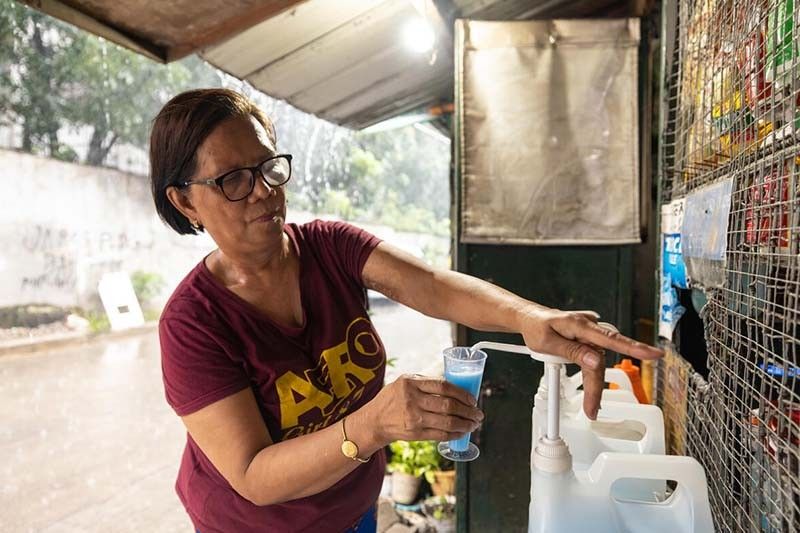Beyond replacing sachets, refill system better for store owners and consumers

MANILA, Philippines — Reuse and refill systems are crucial for tackling plastic pollution by displacing single-use sachets, while also offering a viable business model that benefits both retailers and consumers, according to a report by an environmental organization.
Greenpeace Philippines said its “Kuha sa Tingi” project—which integrates refilling stations in community-based stores such as sari-sari stores—contributed to the avoidance of single-use plastics as well as delivered savings for consumers and increased income for retailers.
Pioneered last year in Quezon City and San Juan City, the “Kuha sa Tingi” project introduced refill systems for household products such as multipurpose cleaner, dishwashing liquid, detergent, and fabric conditioner in sari-sari stores at competitive price points.
According to Greenpeace, refill hubs located in Quezon City were able to divert around 47,601 sachets in just eight weeks. Meanwhile, a total of 8,452 sachets were avoided during a six-week pilot run in San Juan refilling stations.
The report said that refilling home care products resulted in an estimated cost saving of 201% compared to sachets. Sari-sari stores hosting refill stations also saw a 15% increase in profit.
“The project is a huge help in our daily lives. It significantly adds to our daily income. As a solo parent, it is very important,” said Daisy Borja, a retailer from Brgy. Batasan Hills in Quezon City.
Quezon City Mayor Joy Belmonte called the reuse and refill model a “win-win solution for all.”
“Sellers earn more, buyers save more, and most importantly, this business model does not sacrifice the environment. Everybody wins—the seller wins, the consumer wins, the environment wins,” Belmonte said.
The city chief executive added that the results of the project suggest that environmentally friendly alternatives will be preferred by the public if they are convenient and affordable.
‘Tingi’ culture
Sachets are a big part of the plastic crisis in the Philippines, with an average Filipino using 591 single-use packets every year, according to a report by the Global Alliance for Incinerator Alternatives (GAIA) in 2019. This translates to over 58.9 billion sachets discarded annually.
However, a survey commissioned by GAIA in 2019 also indicated Filipinos’ openness to buying products in recyclable or refillable containers.
The survey found that 68% are interested in refillable or recyclable containers for condiments, 42% for personal care products, and 29% for liquid household cleaners.
The “Kuha sa Tingi” project does not only seek to replace single-use plastics with refill systems, but also revitalize the ethos of the Filipino “tingi” (small quantities) culture.
“Sachet is not a Filipino tradition, tingi is. Sachet causes pollution, harms people. It’s something we need to change, and this is one pathway to that change,” Greenpeace country director Lea Guerrero said.
The report noted that the Philippines’ “tingi-tingi” culture originated with reusable containers and refilling from larger storage receptacles. Filipinos traditionally purchased goods using bayong, woven bags or baskets.
Systemic changes, enabling policies
Upstream solutions such as reuse and refill will be more effective in addressing the plastic crisis if combined with strong zero waste policies, Greenpeace Philippines stressed.
“Corporations must change the way they do business and enact widespread systemic changes on what materials they rely on, as well as on their product delivery systems,” the report read.
It urged corporations to phase out sachet packaging, and eliminate the production of disposable plastic products.
Greenpeace Philippines stressed the need for a strong regulatory framework that addresses plastic pollution from the ground up by looking at the complete lifecycle of plastics, moving beyond just waste management.
It added that the Extended Producer Responsibility Act should be revised and strengthened to change its focus from plastic waste recovery and disposal to the reduction of plastic pollution.
There is also a need to provide government support mechanisms for businesses implementing reuse and refill systems, and incentivize consumers through discounted rates or a reward system.
“With political will, as seen in Quezon City and San Juan City, these models can be effectively replicated and scaled up, and will provide benefits to citizens and the local government unit by reducing sachet pollution, material resource usage, and greenhouse gas emissions,” Greenpeace Philippines zero waste campaigner Marian Ledesma said.
“In doing so, they subsequently decrease the harms felt by affected communities throughout the lifecycle of plastic,” she added.
- Latest






























